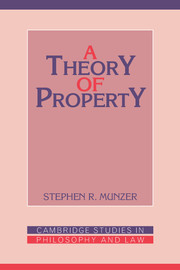Book contents
- Frontmatter
- Contents
- Preface and acknowledgments
- 1 Property, justification, and evaluation
- Part I Property rights and personal rights
- Part II From individuals to social context
- 4 Incorporation and projection
- 5 Control, privacy, and individuality
- 6 Property and moral character
- 7 Alienation, exploitation, and power
- Part III Justification and distributive equity
- Part IV Applications
- Table of cases
- Index of names
- Index of subjects
5 - Control, privacy, and individuality
Published online by Cambridge University Press: 05 June 2012
- Frontmatter
- Contents
- Preface and acknowledgments
- 1 Property, justification, and evaluation
- Part I Property rights and personal rights
- Part II From individuals to social context
- 4 Incorporation and projection
- 5 Control, privacy, and individuality
- 6 Property and moral character
- 7 Alienation, exploitation, and power
- Part III Justification and distributive equity
- Part IV Applications
- Table of cases
- Index of names
- Index of subjects
Summary
PRIVATE PROPERTY AND EXCLUDABILITY
The preceding discussion of property and personality leaves at least two loose ends regarding personal characteristics and situations. It does not pursue things besides personality that property might affect. Nor does it relate property to economic organization. This chapter tries to rectify these shortcomings.
The discussion steers between two extremes and establishes an intermediate position. It rejects, on the one hand, the extreme view that private property is necessary to achieve the personal goods of control, privacy, and individuality, and that achieving them offers a powerful justification for private property. The discussion also rejects, on the other hand, the extreme view that private property has but a tenuous relation to these “goods,” which, because they reflect either weird or “bourgeois” values, can hardly provide much of an argument for private property anyway. The chapter secures instead an intermediate position: Important connections exist between private property and control, privacy, and individuality. These connections hardly demonstrate that strong private-property rights are essential to a satisfactory society. But they do indicate that private property does some good things – though exactly which things, and how much good, varies from one economic system to another. The argument for this intermediate position is not a boring compromise. For it casts doubt on laissez faire capitalism, repels the suggestion that charitable donations or welfare benefits can cure the evils of economic inequality, links property rights in certain economies to self-respect and self-esteem, and introduces the concepts of minimal and appropriately equal property holdings that will play key roles in Chapter 9.
- Type
- Chapter
- Information
- A Theory of Property , pp. 88 - 119Publisher: Cambridge University PressPrint publication year: 1990

